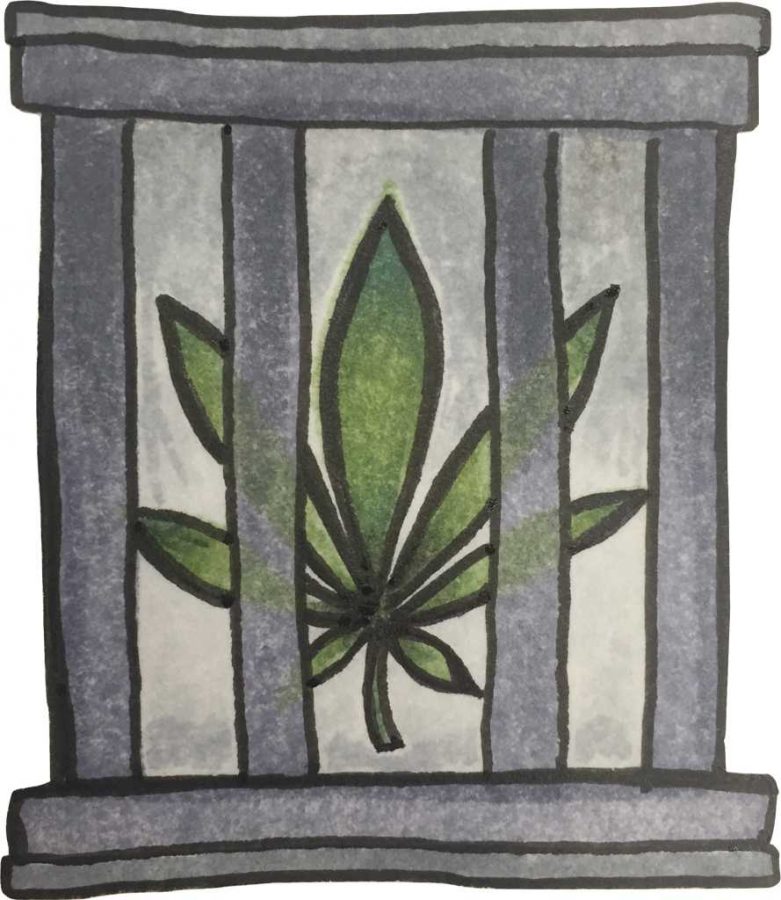When it comes to drug crimes — whether it’s the drug lord, supplier, dealer or user — the legal response is imprisonment.
On Jan. 8, Mexican authorities captured Joaquin “El Chapo” Guzman and arrested him for the third time. As the head of one of the biggest drug cartels in Mexico and the United States, his arrest garnered international attention. But it nabbed a bigger spotlight the day after his arrest when Rolling Stone released his private interview with actor and political activist Sean Penn.
With the media and U.S. law enforcement’s fixation on taking down drug cartels, El Chapo’s arrest is a misleading illusion. Although his arrest may seem to represent a victory for the war on drugs, it overshadows the millions of Americans still being incarcerated for addiction and nonviolent drug offenses.
We are still fighting a losing battle. Ana Maria Salazar, an ex-U.S. drug enforcement official, argues that his arrest will not even deal a hard blow on the drug war, as his cartel’s close colleagues have since taken over his turf.
This irony is an example of America’s overemphasis on aggressive law enforcement, despite the rising rates of overdose and financial costs leading to mass incarceration. The media’s obsession with his overdue arrest also fuels the perception we have of taking down kingpins and drug cartels as the solution to minimizing drug crime.
Not only did his arrest divert attention from the progress we’ve made by using alternative drug reforms, the interview with Penn portrayed him in an overwhelmingly positive light despite the notorious violence and corruption he caused in Mexico.
He received a voice to tell the world his story and give justification for his work — an opportunity that very few nonviolent incarcerated drug users ever receive.
When our criminal justice system that attempts to arrest low-level drug users silences those users, we need to refocus our priorities and listen to the same people the system is trying to confine. Their stories and arrests do not get the same press or attention that they rightfully deserve, and by depriving drug users of attention, we can’t effectively solve the drug problem plaguing our communities. If trying to figure out why we have a nationwide drug problem, who better to ask them the individuals suffering through substance problems?
We must balance our efforts of reducing drug trafficking and cartels with decriminalization and rehabilitation programs. The first step is allowing the people in need of our help the opportunity to be heard without fear of incarceration, which has been sensationalized through arrests, such as El Chapo’s, and wrongly seems like the only strategy to combat drug use.
As a country with one of the highest rates of illicit drug users and the world’s highest incarceration rate with 2.2 million people in the nation’s jails or prisons, we have to do better. The war on drugs has cost $51 billion annually and $81 billion on incarceration. These figures show a massive sum of taxpayer money going toward these outdated, ineffective systems.
According to the Bureau of Justice Statistics, 50.1 percent of all federal prisoners in 2014 were incarcerated for drug crimes. Furthermore, police arrested 1.5 million people for nonviolent drug charges – disproportionately affecting black and Latino people.
Progressive drug reforms, such as the legalization of marijuana, have proven to counteract the trafficking of marijuana from Mexico. The U.S. Border Patrol has reported a decrease in marijuana trafficking after the legalization of the drug in the United States, from seizing 2.5 million pounds in 2011 to 1.9 million pounds in 2014.
According to Time Magazine, this decline has cartels pushing harder drugs, such as heroin and crystal meth, into U.S.-Mexican borders. Because of this push, the increase in heroin-related fatalities is becoming an epidemic. According to the Centers for Disease Control and Prevention, heroin overdoses have nearly quadrupled in the last decade — a critical problem we need to confront.
The Obama administration is trying to combat heroin overdoses — his emphasis of treatment over punishment is a much-needed direction we need to follow. Unfortunately, the National Institute on Drug Abuse reported that 22.7 million Americans needed treatment related to drugs and alcohol in 2014, but only 2.5 million people received treatment at a specialty facility.
Other alternatives to incarceration could include investing in drug research, prevention programs, harm reduction policies and putting a limit on the number of opiates doctors prescribe to patients with addictive .
In terms of incarceration, lower minimum mandatory sentences, education during imprisonment, job training programs or clearing criminal records could directly benefit those who are imprisoned for drug crimes by allowing them the opportunity to seek medical help while reclaiming their lives.
Our legislators must abolish the strict law enforcement approach toward drug crime in order to protect the addicted and nonviolent users who are unjustly criminalized.
If we shift the focus from drug lords like El Chapo to people suffering from drug addiction, we can pave the path to reform with the voices of the silenced majority.


